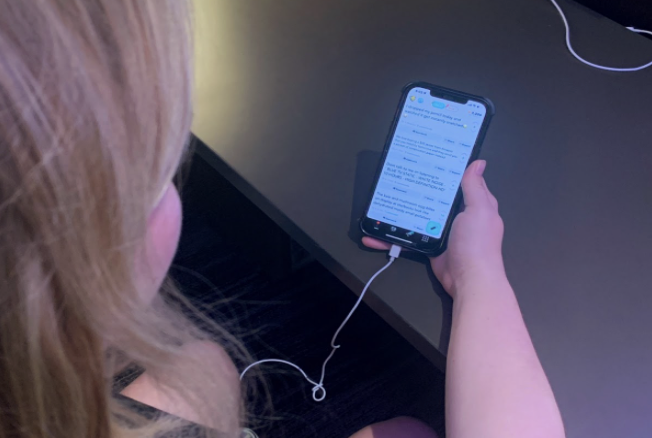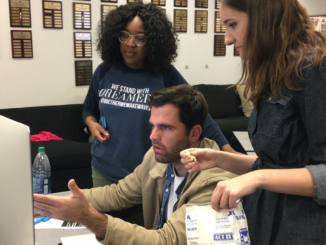
Yik Yak yapped back into college campuses August 2021 posing a notorious threat: Anonymity.
The unfiltered social media app has made a comeback after a four-year hiatus due to comments involving bomb threats, gun violence, discrimination and sexual harassment. The platform plummeted in engagement after multiple universities banned the app from campuses in 2017, fading its relevance from app stores.
Users can anonymously post threads, called Yaks, viewable within a 5-mile radius, and use an ‘up-vote, down-vote’ point system that orders messages based on popularity. The app provides college students the ability to voice almost anything without revealing one’s identity. As a result, the app has become a space for insensitivity, racism, harassment and personal attacks.
Yik Yak has a direct impact on Pepperdine’s small student community, producing hurtful personal effects.
“It creates a stage for kinda the worst in the human heart to come out,” said Kelly Haer, executive director of the Boone Center for the Family and director of the Relationship IQ Program.
Students said they wrestle over where to draw the line between what’s funny and what’s offensive. Because there is a perception that there are no repercussions, students feel protected by the app’s anonymity.
Yik Yak’s downfall and revival
Two students, Brooks Buffington and Tyler Droll started Yik Yak as an anonymous social media platform at Furman University in 2013. The app itself posed multiple threats during its peak between 2013 and 2017.
The company raised $73 million and was valued at around $400 million in 2014, according to TechCrunch.
Yik Yak plummeted in 2017 when educational institutions began to ban the app due to cyberbullying and a rise of violent offenses.
At the University of Missouri, campus police arrested Hunter M. Park and charged him with making threats of violence against Black students on Yik Yak, Sarah Larimer wrote in a 2015 Washington Post article.
Also in 2015, Emily Sakamoto, a student at Emory University, made threats to shoot up the school, T. Rees Shapiro wrote in a Washington Post article.
Many college campus organizations suggested redirecting harassment by banning Yik Yak and other anonymous platforms from on-campus WiFi networks or asking the company to set up geo-fencing, which disabled the app within a targeted area of middle schools, high schools or college campuses.
In 2014, high school student Elizabeth Long initiated a petition using Change.org calling on Yik Yak to shut down its platform after receiving hateful messages about her on her feed. At first, the petition only gained around 100 signatures, but once the app hit college campuses that fall, the petition accumulated over 78,000 signatures.
Back in November 2015, Pepperdine students advocated for the removal of Yik Yak from campus university internet servers or WiFi connections after a surge in racist comments. In solidarity with a protest against racial injustice at the University of Missouri and other institutions across the nation, about 100 students participated in a peaceful sit-in. Students called for Pepperdine senior administrators to acknowledge the attacks toward minority students at Seaver College, according to the Pepperdine Graphic.
The racist comments caught the attention of many campus organizations, including the Black Student Association, Inter-Club Council and the Student Government Association.
Pepperdine administrators did not ban the app from campus.
By the end of 2016, user downloads had dropped 76% in comparison to 2015, Lora Kolodny wrote in a TechCrunch article. In April 2017, the company announced the app would be shutting down.
Square purchased the rights to redevelop the Yik Yak app from the original makers in February 2021 for $1 million, and relaunched the app in August, according to TechCrunch.
The company has implemented new policies where any user who condones bullying, uses hate speech or makes a threat in any way that is in violation of the company’s policies, could be immediately banned from the app.
“We’re committed to combating bullying on our platform by any means necessary,” Yik Yak officials wrote in a company statement.
After the app’s downfall, Yik Yak has been implementing new measures to ensure a safer space to avoid cyberbullying.
Yik Yak is not as anonymous as students think. The app requires users to enter their phone numbers when they create an account. Any post can be traced back to their phone number and account.
There are several other apps such as Whisper, Anomo, Gossop, Sarahah and Babbly that utilize anonymity to their platform’s advantage.
Despite Yik Yak’s new guidelines, there have still been incidents with the app this fall. In Illinois, police arrested a male student after he allegedly threatened violence involving a gun December 2021, Jakob Emerson wrote in a Fox Illinois article.
Police charged a University of Nebraska-Lincoln freshman with threatening the chancellor on social media in November, according to U.S. News & World Report
In North Carolina, Greenville police arrested students who posted a racially motivated post on Yik Yak, according to a WNCT9 article.
Effects on student life
Pepperdine’s small community is vulnerable to gossip spreading.
With the app’s revival in August, feeds quickly filled with a variety of negative, neutral and positive messages.
What’s in the Caf today? How do the shuttles work? Who’s going to the pep rally tonight?
The majority of messages consist of day-to-day updates, complaints about campus life or the dynamics of living in Malibu.
“I think as college students, we have a lot to say and complain about,” said Claire Atchison, a first-year pre-integrated marketing communication major. “I think most people aren’t comfortable complaining openly, so Yik Yak has just become a hub for these voices.”
However, there are also Yaks that negatively target and attack individuals, organizations or faculty.
For example, students have posted specific Yik Yaks complaining about a professor’s test being too hard, or making critical comments about a Greek life event, sports team or student activities. Yaks have also accused students of sexual assault.
“I think name-dropping is probably one of the most hurtful kind of messages I’ve seen,” Atchison said. “Pepperdine being small, seeing someone you know being exposed must be horrible and I just cannot imagine and hope to never be in that position.”
Anonymous exposure is a common fear among many.
“What’s odd is that people still experience great pain and hurt from comments that are said even though it should mean a lot less when someone won’t put their name on it,” Haer said. “My sense is that it should be taken differently if someone did put their name to it.”
Anonymity is a powerful tool where people can voice opinions without judgment, criticism or consequence, Haer said.
“Allows people in an emotional moment to say something that they would never say to someone’s face they would probably not even say if their name was attached to it on some other social media,” Haer said.
The app allows for a new form of cyberbullying that the university has not seen since 2015, students said.
“I’ve seen a lot of negative comments toward freshmen, and as an RA it’s concerning to see messages targeting the community I’m supposed to care for,” said Lidia Qaladh, a sophomore biology major and resident advisor for Eden House.
Haer believes students should stop engaging on Yik Yak.
Haer said that if students don’t use the app, no harm could be done.
“When you don’t have to acknowledge who you are it just frees people up to say whatever because they don’t have to stand by it,” Haer said. “There’s just next to no repercussions for it.”
First-year economics major Cameron Sue views Yik Yak as a humorous space of communication.
“There’s a lot to relate and laugh about,” Sue said. “It’s interesting to see a lot of people here have similar ideas about things.”
Sue said he uses Yik Yak not only at Pepperdine but on other college campuses like University of California, Los Angeles and University of Southern California.
“It’s funny seeing what other college students say about their campus even though I can’t relate to it.”
On the other hand, Sue pointed out how he does not use the app when he goes back home.
“Even though I understand what people are saying, it’s not as engaging and fun compared to college Yik Yak .”
Because Malibu is small in size and population, Malibu Yik Yak is composed of almost entirely student-related content.
Pepperdine administrator declines to yak about the Yak
Pepperdine Student Life has not released a statement on Yik Yak’s campus presence.
Connie Horton, vice president of Student Life, declined to comment for this story.
“I don’t think administration will take down Yik Yak until some very serious incident occurs,” said Sue.
Declan Boyle reported this enterprise story in Jour 241 during the Spring 2022 semester under the supervision of Dr. Christina Littlefield and Dr. Theresa de los Santos. Dr. Littlefield supervised the web article.




